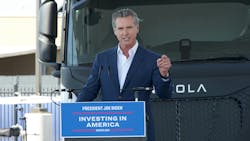California’s governor officially vetoed two major bills that proposed regulations for heavy-duty autonomous vehicles in the state.
On September 27, Governor Gavin Newsom simultaneously vetoed AB-2286, which would have required all heavy-duty autonomous vehicles to have a human safety operator physically present, and AB-3061, which would have introduced a suite of operational reporting requirements.
California is a major development nexus for heavy-duty vehicle technologies. The veto cements the state Department of Motor Vehicles’ latest draft regulations as the central regulation for heavy-duty AVs going forward.
See also: NTEA, SEMA sue to stop CARB's Advanced Clean Fleets
Another bill bites the dust
California’s legislature has been pushing for an effective heavy-duty autonomous vehicle ban for over a year now.
The legislature almost unanimously approved two bills that would have required a human operator until at least 2030: one in September 2023, which Newsom quickly vetoed, and AB-2286 in September 2024, which was nearly identical to the previous year’s bill.
With Newsom’s latest veto, all three proposed heavy-duty AV bills have failed to become law.
The state’s Senate and Assembly passed all three bills with such an overwhelming majority that a veto would seem likely. The Senate and Assembly passed AB-2286 with 32-3 and 70-1, and passed AB-3061 with 31-7 and 65-4, respectively.
However, California’s legislature is uniquely opposed to overriding its governor's vetoes. The legislature has not tried a gubernatorial veto override in over 40 years.
Why did Newsom veto these bills?
In his September 27 veto messages, Newsom explained that he vetoed the bills because the California Department of Motor Vehicles is already working on regulations for heavy-duty AVs.
“As we continue to move forward, it is important to note that 35 jurisdictions—including Arizona, Nevada, Texas, Washington, and the District of Columbia—have already authorized the testing of heavy-duty autonomous vehicles,” Newsom said in his veto message for AB-2286. “California remains the only state to actively prohibit these vehicles.”
The California DMV also released draft regulations on heavy-duty AV testing and deployment permitting at the same time that the bills passed the state legislature.
When Newsom vetoed the previous heavy-duty AV ban in 2023, he gave a similar justification before the state DMV had any draft regulations to show: The regulation was "unnecessary" because DMV already had the authority to develop a regulatory framework, and that the draft regulations would likely be out "in the coming months."
Newsom said that he vetoed AB-3061, meanwhile, because “the timeline it imposes is infeasible for the DMV to implement these new requirements and address the associated operational challenges involved.”
The state DMV’s draft regulations
The draft regulations provide a vague outline of how the state plans to permit autonomous trucks: Manufacturers would have to receive an initial permit for testing with an operator still in the vehicle, pass that drivered testing, receive a permit for driverless testing, and then pass driverless testing to receive a driverless deployment permit.
The draft regulations would also limit AVs to public roads with speed limits of 50 mph or greater and prohibit AVs for passenger or hazardous material transport.
The state DMV is accepting public input for the draft until October 14.
About the Author
Jeremy Wolfe
Editor
Editor Jeremy Wolfe joined the FleetOwner team in February 2024. He graduated from the University of Wisconsin-Stevens Point with majors in English and Philosophy. He previously served as Editor for Endeavor Business Media's Water Group publications.

